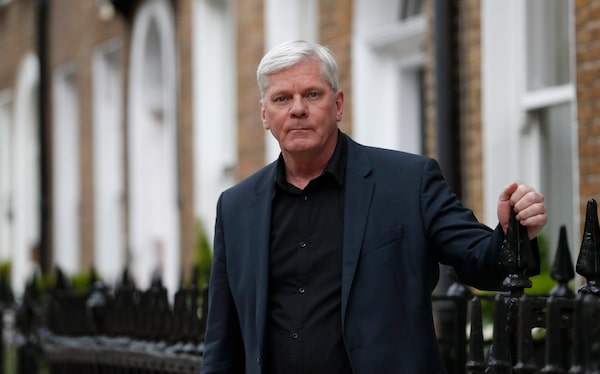
Wikileaks editor-in-chief Kristinn Hrafnnson shown during an interview in London, on April 12, 2019.Alastair Grant/The Associated Press
WikiLeaks founder Julian Assange has exchanged a small room at the Ecuadorian Embassy in central London for a cell at Belmarsh Prison, a grim institution in the southeast part of the city where he nevertheless has certain advantages he didn’t have when he was holed up, hiding from the law.
WikiLeaks editor-in-chief Kristinn Hrafnsson said on Friday that the ailing Mr. Assange should finally be able to receive medical care and will be able to meet with his lawyers more easily than he could in the embassy, where a feud with Ecuadorian authorities had led to a ban on most guests.
The 47-year-old Mr. Assange has extreme shoulder pain and tooth pain, Mr. Hrafnsson said.
For nearly seven years, Mr. Assange lived in the embassy without taking a step outside for fear of being arrested and sent to the United States to be prosecuted.
On Thursday, British authorities dragged the Australian native from the embassy, and U.S. authorities announced charges against him of conspiring to break into a Pentagon computer, setting up what is expected to be an epic legal and political battle over whether to extradite him to the United States.
His arrest became possible after Ecuador revoked his political asylum, complaining that he was an obnoxious house guest who didn’t clean up after his cat and that WikiLeaks was plotting to blackmail the Latin American country’s President.
At the prison, where he is being held while the extradition process plays out, “there are medical facilities there, access to dental care I would assume, and a garden to go out into,” Mr. Hrafnsson said.
“But comparing one prison to another and giving a star rating is not really what’s on my mind,” he said. “What’s on my mind is there’s an innocent man in prison for doing his job as a journalist, and that’s an outage.”
He said Mr. Assange is in relatively good mental condition considering the stress of recent days.
WikiLeaks founder Julian Assange faces imprisonment, extradition to the U.S. after arrest in London
Julian Assange has finally been arrested. What happens now? A guide
The political debate over whether to extradite Mr. Assange is already taking shape, with Britain’s opposition Labour Party urging the government not to hand him over to the Americans. Party Leader Jeremy Corbyn tweeted that the United States is prosecuting Mr. Assange because he exposed “evidence of atrocities in Iraq and Afghanistan.”
Diane Abbott, Labour’s spokeswoman for domestic affairs, told Parliament: “It is this whistle-blowing into illegal wars, mass murder, murder of civilians and corruption on a grand scale that has put Julian Assange in the crosshairs of the U.S. administration.”
The politicization of the case reflects the clashing views of Mr. Assange as either a heroic whistle-blower standing up to the mighty United States or a willing stooge who helped the Russians boost Donald Trump’s presidential campaign by publishing hacked e-mails that embarrassed his rival, Hillary Clinton.
Mr. Assange’s bid to fend off extradition could take years and involve several layers of appeal. He could also face a second extradition request if Sweden decides to pursue a rape case against him that was suspended in 2017, when he was in the embassy, beyond the reach of the law.
If found guilty of the U.S. charges, Mr. Assange could get five years in prison. His next court appearance is set for May 2 via a prison video link.
Extradition lawyer Ben Keith said the court will not assess the evidence against Mr. Assange to determine his guilt or innocence but will scrutinize whether the offence he is accused of in the United States would be a crime in Britain.
“The most likely outcome is that he will be extracted to the United States,” he said.
If Mr. Assange loses in extradition court, he could appeal several times and ultimately try to have his case heard at the European Court of Human Rights – unless Britain has left the European Union by that time.